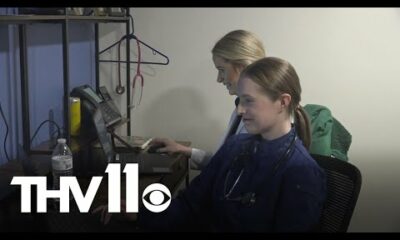Kaiser Health News
Beyond PMS: A Poorly Understood Disorder Means Periods of Despair for Some Women
Lauren Peace, Tampa Bay Times
Wed, 03 Jul 2024 09:00:00 +0000
If you or someone you know may be experiencing a mental health crisis, contact the 988 Suicide & Crisis Lifeline by dialing or texting “988.”
For the most part, Cori Lint was happy.
She worked days as a software engineer and nights as a part-time cellist, filling her free hours with inline skating and gardening and long talks with friends. But a few days a month, Lint’s mood would tank. Panic attacks came on suddenly. Suicidal thoughts did, too.
She had been diagnosed with anxiety and depression, but Lint, 34, who splits her time between St. Petersburg, Florida, and Tulsa, Oklahoma, struggled to understand her experience, a rift so extreme she felt like two different people.
“When I felt better, it was like I was looking back at the experience of someone else, and that was incredibly confusing,” Lint said.
Then, in 2022, clarity pierced through. Her symptoms, she realized, were cyclical. Lint recognized a pattern in something her doctors hadn’t considered: her period.
For decades, a lack of investment in women’s health has created gaps in medicine. The problem is so prevalent that, this year, President Joe Biden signed an executive order to advance women’s health research and innovation.
Women are less likely than men to get early diagnoses for conditions from heart disease to cancer, studies have found, and they are more likely to have their medical concerns dismissed or misdiagnosed. Because disorders specifically affecting women have long been understudied, much remains unknown about causes and treatments.
That’s especially true when it comes to the effects of menstruation on mental health.
When Lint turned to the internet for answers, she learned about a debilitating condition at the intersection of mental and reproductive health.
Sounds like me, she thought.
What Is PMDD?
Premenstrual dysphoric disorder, or PMDD, is a negative reaction in the brain to natural hormonal changes in the week or two before a menstrual period. Symptoms are severe and can include irritability, anxiety, depression, and sudden mood swings. Others include fatigue, joint and muscle pain, and changes to appetite and sleep patterns, with symptoms improving once bleeding begins.
Unlike the mild discomfort of premenstrual syndrome, or PMS, the effects of premenstrual dysphoric disorder are life-altering. Those afflicted, according to one estimate, can endure almost four years of disability, cumulatively, over their lives.
Though researchers estimate that the dysphoric disorder affects around 5% of people who menstruate — about the same percentage of women with diabetes — the condition remains relatively unknown, even among health care providers.
In a 2022 survey of PMDD patients published in the Journal of Women’s Health, more than a third of participants said their family doctors had little knowledge of the premenstrual disorder or how to treat it. About 40% said the same was true of their mental health therapists.
Reproductive mental health has been sidelined as a specialty, said Jaclyn Ross, a clinical psychologist who researches premenstrual disorders as associate director of the CLEAR Lab at the University of Illinois-Chicago. Only some health care providers get training or even become aware of such disorders, Ross said.
“If you’re not considering the menstrual cycle, you’re at risk of misdiagnosing and missing what’s actually going on,” Ross said.
That was the case for Tampa, Florida, resident Jenna Tingum, 25, who had panic attacks and suicidal thoughts as a premed student at the University of Florida. It wasn’t until her college girlfriend read about PMDD online and noticed Tingum’s symptoms flared in the days leading up to her period that Tingum talked with her gynecologist.
“I don’t think I would have ever put the pieces together,” Tingum said.
Suicide Risk and Treatment
Because few researchers study the condition, the cause of PMDD is something of an enigma, and treatments remain limited.
It wasn’t until 2013 that the disorder was added to the Diagnostic and Statistical Manual, the handbook used by medical professionals in the U.S. to diagnose psychiatric conditions. PMDD was officially recognized by the World Health Organization in 2019, though references in medical literature date to the 1960s.
Defining the disorder as a medical condition faced early pushback from some feminist groups wary of giving credibility to stereotypes about PMS and periods. But Ross said patients must be taken seriously.
In one study, 72% of respondents with the disorder said they’d had suicidal thoughts in their lifetime. And 34% said they had attempted suicide, compared with 3% of the general population.
Marybeth Bohn lost her daughter, Christina Bohn, to suicide in 2021. It was only in the months before her death at age 33 that Christina connected her extreme distress to her cycle — no doctors had asked, Bohn said. Now Bohn, who lives in Columbia, Missouri, works with medical and nursing schools around the country to change curricula and encourage doctors to ask people in mental health emergencies about their premenstrual symptoms and cycles.
“We need more research to understand how and why these reactions to hormones occur,” Ross said. “There’s so much work to be done.”
While doctors haven’t settled on a universal approach to address the symptoms, three main treatments have emerged, said Rachel Carpenter, medical director of reproductive psychiatry at the University of Florida–Jacksonville College of Medicine.
Selective serotonin reuptake inhibitors, the most common form of antidepressants, are a first line of attack, Carpenter said. Some patients take the medication regularly; others in just the week or two that symptoms occur.
For some patients, hormonal birth control can alleviate symptoms by controlling or preventing the release of certain hormones.
Finally, talk therapy and cycle awareness can help patients build mental resilience for difficult weeks.
Sandi MacDonald, who co-founded the International Association for Premenstrual Disorders, a leading resource for patients and clinicians, said peer support is available through the nonprofit, but funding for research and education remains elusive.
She hopes the new White House initiative on advancing women’s health research will open doors.
Let’s Talk About Periods
Both Lint and Tingum, who were diagnosed by medical professionals after learning about the disorder on their own, said a lack of conversation around periods contributed to their care being delayed.
Lint doesn’t remember talking much about periods in grade school; they were often the butt of a joke, used to dismiss women.
“For the longest time, I thought, ‘Well, this happens to everyone, right?’” Lint said of her symptoms. “Has a doctor ever asked me what my symptoms are like? No, absolutely not. But we’re talking about a quarter or more of my life.”
Brett Buchert, a former University of Florida athlete who took time away from campus because her symptoms were so severe, said that when doctors do ask questions, it can feel like boxes being checked: “The conversation ends there.”
Buchert, who graduated with a degree in psychology and now lives in Boulder, Colorado, said understanding what’s happening to her and being aware of her cycle has helped her manage her condition.
Lint and Tingum agreed.
Even as Lint struggles to find a medicine that brings relief, tracking her cycle has allowed her to plan around her symptoms, she said. She makes fewer commitments in the week before her period. She carves out more time for self-care.
She’s also found solace in reading stories of others living with the condition, she said.
“It’s helped me process the extremes,” Lint said. “There’s not something wrong with me as an individual. I’m not crazy; this is something that’s legitimately happening to me. It helps to know I’m not alone.”
This article was produced through a partnership between KFF Health News and the Tampa Bay Times.
——————————
By: Lauren Peace, Tampa Bay Times
Title: Beyond PMS: A Poorly Understood Disorder Means Periods of Despair for Some Women
Sourced From: kffhealthnews.org/news/article/premenstrual-dysphoric-disorder-pmdd-beyond-pms/
Published Date: Wed, 03 Jul 2024 09:00:00 +0000
Did you miss our previous article…
https://www.biloxinewsevents.com/pain-doesnt-belong-on-a-scale-of-zero-to-10/
Kaiser Health News
In Settling Fraud Case, New York Medicare Advantage Insurer, CEO Will Pay up to $100M
SUMMARY: Independent Health Association of Buffalo and Betsy Gaffney, CEO of medical analytics firm DxID, have agreed to a settlement of up to $100 million to resolve Justice Department allegations of fraudulent Medicare billing for exaggerated or non-existent health conditions. Independent Health will pay up to $98 million, while Gaffney will contribute $2 million. Neither party admitted wrongdoing. The case was triggered by whistleblower Teresa Ross, highlighting issues of “upcoding” in Medicare Advantage plans. Ross, having faced repercussions for her allegations, will receive at least $8.2 million from the settlement. This case underscores the challenges of regulating billing practices in the Medicare system.
The post In Settling Fraud Case, New York Medicare Advantage Insurer, CEO Will Pay up to $100M appeared first on kffhealthnews.org
Kaiser Health News
Employers Press Congress To Cement Health Price Transparency Before Trump’s Return
SUMMARY: Despite regulations requiring hospitals and insurers to disclose negotiated prices for healthcare services, the impact on consumer costs remains unclear nearly four years later. While the Trump administration’s initial rules and Biden’s enhancements aimed to streamline this data, compliance is inconsistent; a 2022 audit found only 63 out of 100 hospitals met requirements. Some lawmakers proposed legislation to protect these regulations amid uncertainty about Trump’s potential return to office, but efforts fell short. Experts note the complexity of the data often leaves consumers struggling to understand their actual costs, emphasizing the need for improved transparency and enforcement to facilitate informed healthcare choices.
The post Employers Press Congress To Cement Health Price Transparency Before Trump’s Return appeared first on kffhealthnews.org
Kaiser Health News
He Went in for a Colonoscopy. The Hospital Charged $19,000 for Two.
SUMMARY: Tom Contos, a 45-year-old runner, sought a colonoscopy due to ongoing rectal bleeding. His insurance covered part of the procedure, but he was shocked by the final bill of $19,206, which included charges for two colonoscopies. Despite an initial estimate of $7,203, the charges were much higher due to multiple procedures and biopsies. Contos appealed the charges, but Northwestern Medicine maintained that the billing was correct. Health experts suggest patients consider alternatives like ambulatory surgery centers for lower costs. Transparency and clear pricing are key to avoiding unexpected medical expenses.
The post He Went in for a Colonoscopy. The Hospital Charged $19,000 for Two. appeared first on kffhealthnews.org
-

 News from the South - Arkansas News Feed7 days ago
News from the South - Arkansas News Feed7 days agoFaith-inspired ministry opens health clinic in Little Rock
-

 News from the South - Florida News Feed6 days ago
News from the South - Florida News Feed6 days ago‘Dirty Dancing,’ ‘Beverly Hills Cop,’ ‘Up in Smoke’ among movies entering the National Film Registry
-

 Our Mississippi Home5 days ago
Our Mississippi Home5 days agoThe Meaning of the Redbird During the Holiday Season
-

 Mississippi Today4 days ago
Mississippi Today4 days agoMississippi PERS Board endorses plan decreasing pension benefits for new hires
-

 Local News1 day ago
Local News1 day agoHard Rock Hotel & Casino Biloxi Honors Veterans with Wreath-Laying Ceremony and Holiday Giving Initiative
-

 News from the South - North Carolina News Feed2 days ago
News from the South - North Carolina News Feed2 days agoSocial Security benefits boosted for millions in bill headed to Biden’s desk • NC Newsline
-

 News from the South - Missouri News Feed2 days ago
News from the South - Missouri News Feed2 days agoCould prime Albert Pujols fetch $1 billion in today's MLB free agency?
-

 Mississippi News Video3 days ago
Mississippi News Video3 days ago12/19- Friday will be breezy…but FREEZING by this weekend






























